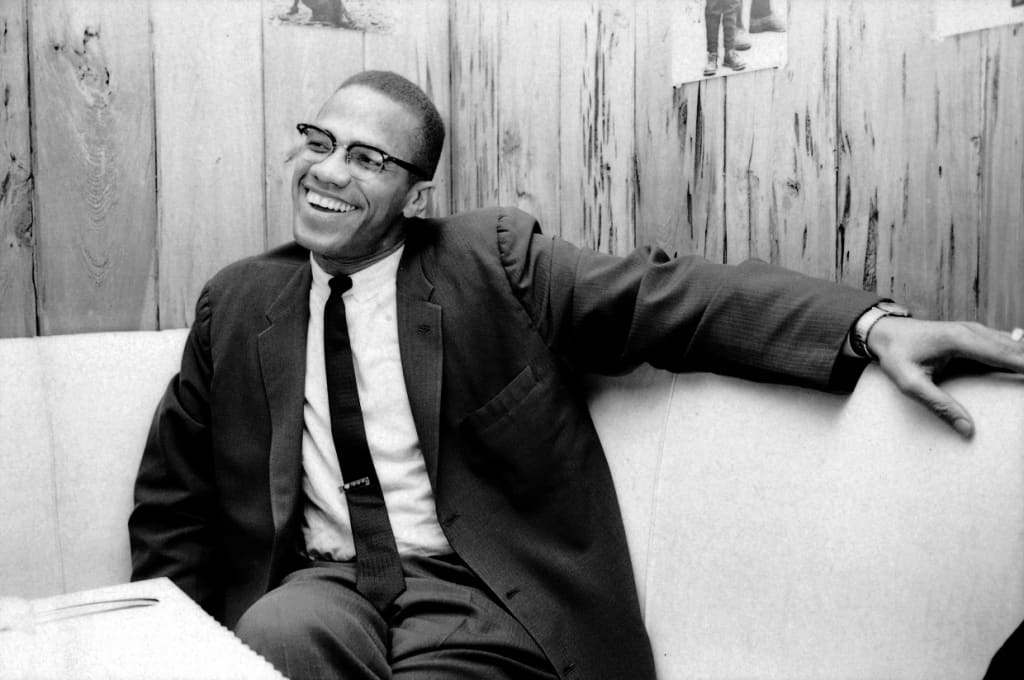Malcolm X: A Life of Transformation and Advocacy
by David Pieringer

Malcolm X: A Life of Transformation and Advocacy
Malcolm X, born Malcolm Little on May 19, 1925, in Omaha, Nebraska, stands as one of the most influential and controversial figures in American history. His journey from a troubled youth to a prominent advocate for African American rights and social justice is a story of profound transformation and unwavering commitment to the fight against racial oppression. This article explores his early life, his rise as a leader in the Nation of Islam, his eventual break with the organization, and his enduring legacy in the civil rights movement and beyond.
Early Life and Struggles
Malcolm Little was born into a world of racial tension and economic hardship. His father, Earl Little, was a Baptist minister and an outspoken supporter of Marcus Garvey, a prominent Black nationalist leader. Earl's activism made the Little family targets of frequent threats and violence from white supremacist groups, including the Ku Klux Klan. In 1931, Earl Little was found dead under suspicious circumstances, widely believed to be a lynching, though it was officially ruled an accident.
The trauma of losing his father and the subsequent institutionalization of his mother, Louise Little, had a profound impact on young Malcolm. He and his siblings were placed in foster care, and Malcolm's early experiences with racism and instability shaped his worldview. Despite his academic potential, Malcolm dropped out of school at the age of 15 after a teacher told him that his dream of becoming a lawyer was unrealistic for a Black boy.
Life of Crime and Imprisonment
After leaving school, Malcolm moved to Boston and later to New York City, where he became involved in a life of crime. He engaged in activities such as drug dealing, gambling, and burglary. This period of his life earned him the nickname "Detroit Red" due to his reddish hair and his involvement in the Harlem underworld.
In 1946, Malcolm was arrested for burglary and sentenced to ten years in prison. It was during his incarceration that Malcolm's life began to change dramatically. He encountered the teachings of the Nation of Islam (NOI), a religious and political organization that advocated for Black self-sufficiency, separation from white society, and the teachings of Islam as interpreted by the NOI's leader, Elijah Muhammad.
Conversion to Islam and Rise in the Nation of Islam
Malcolm embraced the teachings of the Nation of Islam and converted to Islam, changing his last name to "X" to symbolize the loss of his African heritage and his rejection of his "slave" name. Upon his release from prison in 1952, Malcolm X quickly rose through the ranks of the NOI, becoming one of its most influential and charismatic leaders.
As a minister and national spokesperson for the NOI, Malcolm X was known for his fiery oratory and his unapologetic criticism of white America. He condemned systemic racism, police brutality, and the economic and social injustices faced by African Americans. Unlike other civil rights leaders of the time, such as Martin Luther King Jr., who advocated for nonviolent resistance and integration, Malcolm X called for Black empowerment, self-defense, and, if necessary, separation from white society.
Break with the Nation of Islam
In the early 1960s, tensions between Malcolm X and the NOI's leadership began to surface. Malcolm became increasingly disillusioned with Elijah Muhammad, particularly after learning of Muhammad's extramarital affairs, which contradicted the moral teachings of the NOI. Malcolm's growing influence and his willingness to speak out on issues beyond the NOI's control also contributed to the rift.
In 1964, Malcolm X left the Nation of Islam and embarked on a journey of spiritual and ideological transformation. He undertook the Hajj pilgrimage to Mecca, where he encountered Muslims of diverse racial backgrounds and experienced a profound shift in his perspective on race and unity. This journey led him to adopt a more inclusive view of the struggle for human rights and to embrace Sunni Islam.
Formation of the Organization of Afro-American Unity
After his break with the NOI, Malcolm X founded the Organization of Afro-American Unity (OAAU) in June 1964. The OAAU aimed to unite all people of African descent in the fight for human rights and to promote social and economic empowerment. Malcolm's vision for the OAAU was inspired by his travels in Africa and his meetings with African leaders who were engaged in anti-colonial struggles.
The OAAU's platform included demands for civil rights, educational reform, economic justice, and political self-determination. Malcolm X sought to build alliances with other civil rights organizations and to bring international attention to the plight of African Americans by framing their struggle as part of a global fight against oppression and colonialism.
Assassination and Legacy
Malcolm X's life was tragically cut short on February 21, 1965, when he was assassinated while speaking at the Audubon Ballroom in New York City. Three members of the Nation of Islam were convicted of his murder, though controversy and questions about the true nature of the assassination persist to this day.
Despite his death at the age of 39, Malcolm X's influence continues to resonate. His autobiography, co-written with journalist Alex Haley and published posthumously in 1965, remains a seminal work that has inspired countless readers and activists. The autobiography offers a powerful narrative of Malcolm's journey from a life of crime to a life of profound intellectual and spiritual awakening, and it provides a scathing critique of American racism and injustice.
Malcolm X's legacy is multifaceted. He is remembered as a radical thinker who challenged the status quo and forced America to confront its deep-seated racial inequalities. His emphasis on Black pride, self-reliance, and human rights has had a lasting impact on the civil rights movement and the broader struggle for social justice.
Impact on the Civil Rights Movement
Malcolm X's approach to civil rights differed significantly from that of his contemporaries, such as Martin Luther King Jr. While King advocated for nonviolent protest and integration, Malcolm X's philosophy was rooted in Black nationalism and self-defense. His rhetoric often emphasized the need for African Americans to protect themselves from white aggression and to achieve liberation "by any means necessary."
Malcolm's ideas influenced the development of the Black Power movement in the late 1960s and 1970s, which emphasized racial pride, economic empowerment, and political autonomy. Leaders such as Stokely Carmichael and organizations like the Black Panther Party drew inspiration from Malcolm X's teachings and adopted more militant stances in their fight for justice.
Global Influence and Internationalism
Malcolm X's impact extended beyond the United States. His travels in Africa and the Middle East, as well as his engagement with international leaders, positioned him as a global figure in the fight against oppression. He met with leaders such as Gamal Abdel Nasser of Egypt and Kwame Nkrumah of Ghana, who were instrumental in their countries' struggles for independence from colonial rule.
Malcolm's internationalist perspective helped to connect the African American struggle for civil rights with broader anti-colonial movements worldwide. He argued that the fight against racism in America was part of a global struggle for human rights and dignity, and he sought to build solidarity among oppressed peoples across the world.
Personal Life and Transformation
Malcolm X's personal transformation is a testament to his resilience and capacity for growth. From his early days as a street hustler to his rise as a prominent religious and political leader, Malcolm's life was marked by constant evolution. His journey of self-discovery and his willingness to challenge his own beliefs are central to his enduring legacy.
Malcolm's relationships, particularly with his family, played a significant role in his life. He married Betty Shabazz in 1958, and together they had six daughters. Betty was a steadfast partner who supported Malcolm through his numerous trials and tribulations. After Malcolm's assassination, she continued his work, advocating for civil rights and social justice until her own death in 1997.
Cultural and Academic Influence
Malcolm X's life and ideas have been the subject of extensive study and analysis in academic circles. Scholars have examined his contributions to political theory, religious thought, and social movements. His autobiography, in particular, is regarded as a crucial text in the fields of African American studies, history, and literature.
Malcolm's influence is also evident in popular culture. Films, documentaries, and books about his life have reached wide audiences, ensuring that his story remains relevant to new generations. Spike Lee's 1992 film "Malcolm X," starring Denzel Washington, is one of the most notable portrayals of his life, offering a comprehensive and compelling depiction of his journey and impact.
Enduring Relevance
More than half a century after his death, Malcolm X's ideas continue to resonate in contemporary discussions about race, justice, and equality. His critique of systemic racism and his call for Black empowerment are still relevant in addressing the persistent inequalities that affect African American communities today.
The resurgence of movements such as Black Lives Matter reflects the ongoing struggle against racial injustice and the enduring legacy of leaders like Malcolm X. His emphasis on dignity, self-respect, and the right to self-defense remain powerful principles in the fight for civil rights and human rights.
Conclusion
Malcolm X's life is a story of profound transformation, relentless advocacy, and unwavering commitment to justice. From his early experiences with racial violence and poverty to his rise as a prominent leader in the Nation of Islam and his eventual evolution into a global human rights advocate, Malcolm's journey is a testament to the power of resilience and the impact of radical change.
His legacy is multifaceted, encompassing his contributions to the civil rights movement, his influence on global anti-colonial struggles, and his enduring relevance in contemporary discussions about race and justice. Malcolm X remains a symbol of strength, determination, and the ongoing fight for equality and human dignity. Through his words and actions, he has left an indelible mark on history and continues to inspire new generations to pursue justice and to challenge oppression.
About the Creator
David Pieringer
Welcome to my page! I'm a dedicated writer and student with a passion for both education and sports. Balancing my love for learning with my athletic pursuits, I strive to excel in everything I do.
Enjoyed the story? Support the Creator.
Subscribe for free to receive all their stories in your feed. You could also pledge your support or give them a one-off tip, letting them know you appreciate their work.






Comments
There are no comments for this story
Be the first to respond and start the conversation.